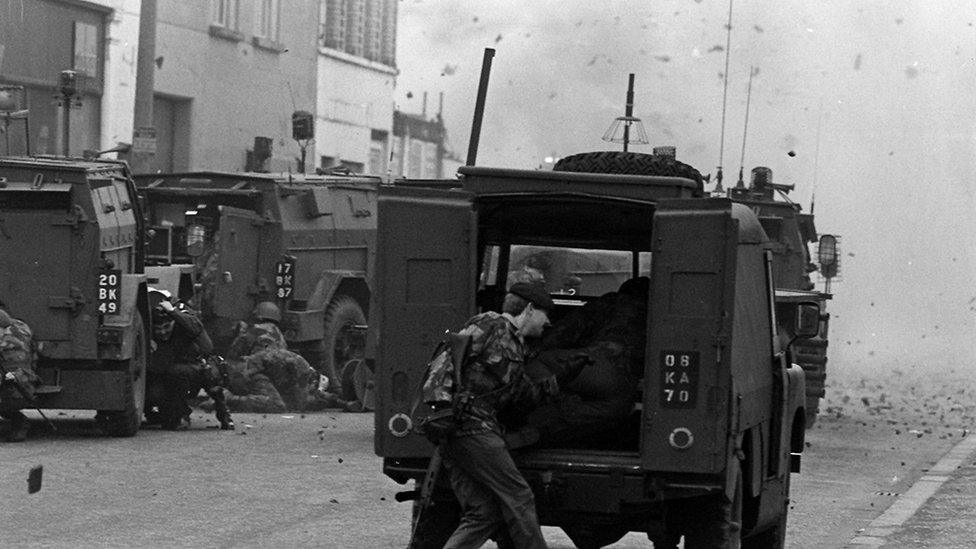Troubles teaching lacking in NI schools, study finds
- Published

The research shows that what teachers could teach is "too flexible from the outset" and that means citizenship is taught differently at schools
A lack of teaching about the NI conflict in schools leaves "partisan narratives unchallenged and wider society unchanged".
That is according to a paper from the Ulster University (UU) School of Education on citizenship education.
It said a failure to teach children about the Troubles and political conflict "leaves the deep-rooted causes of conflict and division untouched".
The paper also said the school system focused too much on exams.
This came at the expense of the "social and emotional dimensions" of education.
A recent report from the Centre for Children's Rights at Queen's University for the Commission for Victims and Survivors also recommended that all children in Northern Ireland should be taught about the Troubles.
But it suggested that current teaching about the conflict "could be selective, partial, lacking in depth or absent" in many schools.
A report from the Commission on Flags, Identity, Culture and Tradition also said many young people were not given the chance to explore culture, identity and tradition in schools.
However, a body representing some history teachers in Northern Ireland had previously rejected criticism of how they taught the conflict.
The UU paper on Citizenship Education studies how a subject called Local and Global Citizenship is taught in Northern Ireland.
It was introduced into the curriculum in 2007 and is part of a wider subject called Learning for Life and Work.
'Frank discussion' not 'political correctness'
According to the Council for the Curriculum, Examinations and Assessment (CCEA), Local and Global Citizenship is meant to allow children to learn and talk about controversial issues.
Those include the "recent past, religion, culture and identity" in Northern Ireland.
The UU paper said the subject aimed to "help young people to explore the causes and consequences of division and difference," both in Northern Ireland and elsewhere.
About £25m was spent between 2002 and 2007 introducing the subject and training teachers to deliver it.
But the UU paper said that what teachers could teach was "too flexible from the outset" and that as a result, "citizenship has been taught in a range of ways across different schools".
"Young people have repeatedly said that they want to learn about conflict-related issues at school - such as equality, sectarianism, politics, cultural identities, parading, unresolved legacy issues and commemorations," the paper said.
It added: "The citizenship classroom needs to be about 'frank discussion' rather than 'promoting political correctness'"
"The flexibility provided in the curriculum for teachers to decide what to teach has created a 'local' loophole to avoid potentially controversial conflict-related issues, in favour of the safer 'global' landscape."

Soldiers running from a bomb in the Smithfield area of Belfast at the height of the Troubles
The UU paper said that many teachers avoided teaching potentially contentious Northern Irish issues, sometimes because they were concerned about how pupils and their parents may react.
"The natural default position for many teachers in the citizenship classroom is to avoid controversy and 'keep the peace'," it said.
'Poor relation'
The paper also took issue with the view held by some that the past should be left behind.
"One of the most significant challenges of teaching conflict-related issues at present is the view that the conflict is over and there is a need to move forward, rather than dwelling on the past," the paper said.
"However, this positioning fails to recognise the reality of Northern Ireland as a divided society with legacies of the conflict continuing to impact on peoples' lives today or it reflects a tacit acceptance that sectarianism and division are a normal part of everyday life."
According to the paper, citizenship is the "poor relation in the Northern Ireland Curriculum."
That means it is given limited time in many schools and many teachers are not trained to deliver it.
The report is also critical of what it called an "assessment and examination culture" in schools.
The roots of Northern Ireland’s Troubles lie deep in Irish history
"The reality of this testing and accountability culture in schools means teachers focus on what the 'system' values, that is, examination grades," it said.
The UU paper calls for the executive, MLAs and the Department of Education to promote and back citizenship education, the training of more specialised teachers and for the school curriculum to change.
"In the post-Brexit era, and at a time when a referendum on the constitutional status of Northern Ireland may be looming, the future direction of our society will rest in the hands of young people as the next generation of the electorate," the paper concluded.
"In that context, education in citizenship cannot be left to chance or be seen as an 'add on'."
- Published6 November 2021
